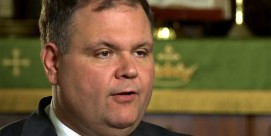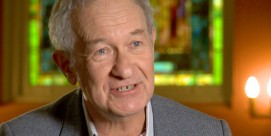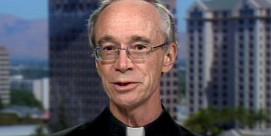In This Episode << SLIDE LEFT TO SEE ADDITIONAL SEGMENTS
Leo Ribuffo Extended Interview
Read more of the R&E interview with historian Leo Ribuffo on evangelicals and politics:
Can you give me a brief history of evangelicals and politics in America?
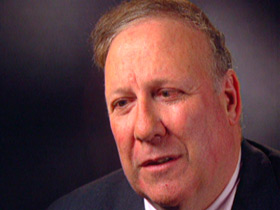
That depends on what you mean by “evangelical.” American evangelical Protestantism has deep roots, going back maybe to the Puritans, certainly to the Great Awakening of the 18th century. The modern term “evangelical” applies to moderate theological conservatives — people like Billy Graham, say. That only becomes common in the 1950s. So it depends on which type of evangelical you want to talk about. I think evangelicals, in the broad sense, have always been involved in politics. One of the oddest alliances in American political history was fighting against the British for independence. It consisted of Enlightenment deists — people like Jefferson — who were strongly pro-independence, and a lot of the heirs to the Great Awakening, who were also strongly pro-independence. They didn’t agree on much else, but that they agreed on. It seems to me that the modern form of evangelicalism, broadly speaking, has its roots at about the same time as Jacksonian democracy, so-called. I think if Andrew Jackson came back in politics, and Charles Grandison Finney came back in evangelicalism, a lot of what they see now would be perfectly intelligible. The Democrats are the more secular party, of course. Evangelicalism in that sense is really kind of a creation of democracy. Each person can read the Bible and come up with his social conclusions, his cultural conclusions, and his political conclusions. That’s something you get in 19th-century evangelicalism that you wouldn’t have gotten from the Puritans, you wouldn’t have gotten from Jonathan Edwards. Of course, this period in the 1820s, ’30s, and ’40s produces, with evangelical impetus, all sorts of reform movements — from antislavery to temperance to the peace movement. It’s all over the place. So in that sense, there is nothing new about evangelicals being active in politics.
Does the intensity of evangelical political involvement today date back to then?
As with many things in American history, there are ebbs and flows. The period of the 1830s and ’40s is a very intense period of evangelical activism in politics. Then you get a less intense phase in the late 19th century, though there is plenty: the rise of temperance, again; the move to put “under God” into the Constitution; various efforts at morals legislation, Prohibition being the most famous that finally succeeds around the time of World War I. There are lots of periods when evangelical activism and politicized evangelical groups are just as strong as now. It’s not a constant, but there certainly are comparable periods.
Is there a constant factor in all of them as to why the movement suddenly emerges to be so influential?
To be glib, the constant factors are two: 1) evangelicals feel under threat by cultural change, real cultural change; and 2) there seems a good opportunity to forge ahead with their program. We see that in the 1870s, 1840s; in the 1920s, it’s much more of a sense that traditional values, Protestant values, are under threat. But there is also a sense by some of the fundamentalists of the 1920s — and that’s a subset of evangelicalism — that Jesus is coming soon; World War I proves that, so now we’ve really got to get organized.
I spoke with an evangelical congressman who indicated that evangelicals will be out in great numbers for President Bush because we’re getting near “the latter days.” Was he speaking alone, or do you think that feeling is out there?
That’s really a very complicated question. We have a popular literature of folks saying that Jesus is returning soon. But we have the same people taking out 30-year mortgages. Evangelicals and fundamentalists are just as complicated as anybody else. So it’s hard to say how much they really believe it. Certainly, it’s true it was very strongly felt in the 1920s, right after that horrendous, apocalyptic war that theological liberals didn’t predict. Plus, the fundamentalists of the 1920s saw in the potential creation of Israel, through World War I diplomacy, a sign that Jesus was returning. Now, that’s a consistent theme, but I think the fact that it really just begins with the British Balfour Declaration of 1917 would mean that, in the ’20s, the feeling of imminent return is much stronger. These are really hard historical questions. How do you judge the zeitgeist of one era versus another? What I would say, if we’re doing a comparative intensity of expectation of Jesus’ return, is that in the late 19th century and in the 1920s, believers in Bible prophecy actually named the person they thought would be the Antichrist; Napoleon III and Benito Mussolini didn’t work out. I think the fact that they don’t name the Antichrist now leaves a lot more wiggle room. Jesus is coming soon, but not in the life of somebody currently 50 years old.
Are these issues that politicians know will sit well with evangelicals?
Oh, sure. Discontent, fear, optimism do not, by themselves, create mass movements. You need someone shrewd, able to mobilize. And at various periods, those leaders arise within evangelical communities. Intelligent politicians know how to take advantage of this.
Is George W. Bush one of those?
I don’t think so. I think the person who deserves credit, without question, for forming the alliance between theologically conservative Protestants, evangelicals, fundamentalists, Pentecostals, and Republican conservatives is Ronald Reagan. It starts in ’79-’80. By ’84, you already have evangelicals and fundamentalists solidly Republican, at roughly the same percentage they are now. And George Bush the younger has picked up as an heir to that. I don’t think he’s built that coalition; he’s the heir to that coalition.
He has certainly responded in deed more than President Reagan did, though, hasn’t he?
Issues change. Bush has certainly talked more about faith-based initiatives. On the other hand, he hardly talks about abortion as much as Reagan did. And it is also true that he feels very uncomfortable with the constitutional amendment against gay marriage. Now, Reagan, too, used his evangelical supporters. He never gave them much of what they wanted. I think it’s a comparable kind of relationship here. It’s pretty clear that President Bush is personally much more of an evangelical than President Reagan, but I think their political relationship with the movement is roughly the same.
The map of the country seems to be divided between those who “live and let live” and then the moral absolutists. Has religion and the involvement of religion in politics become a divisive factor in this country?
Religion in politics has always been something of a divisive factor. For a long time, it was mostly Protestant versus Catholic. Now it seems to be secularist theological liberals, on the one hand, versus theological conservatives on the other. Yet I wouldn’t overstate it. Theological conservatives are human beings, too, and they change. If you took a fundamentalist from the 1920s and sat him down with, say, Jerry Falwell, he would say, “Boy! Jerry Falwell is this really liberal guy. He hangs out with these Catholics and these Jews. He’s made all these compromises.” The evangelical and fundamentalist communities are constantly changing. We’ve got to be careful not to just infer the beliefs of the rank and file of any movement from the more strident statements of the leaders.
So religion isn’t more intertwined with politics now than it has been in the past?
Religious issues have been much more on the national agenda from about the time of the Carter presidency to the present than they were from, say, ’45 to the late ’60s, even though that was the time of an extraordinary religious revival in the country. One of the reasons John Kennedy was able to be elected president by simply affirming the separation of church and state is that there weren’t so many religion-related issues on the plate. Nobody talked publicly about abortion and electoral politics, let alone gay rights. Now those issues are inescapable.
Are evangelicals the most influential bloc in this administration’s foreign policy? One example would be Sudan. Another would be Israel.
I don’t buy that in the least. It seems to me that the most influential members of the administration in foreign policy are by no means evangelical Protestants. They would be neoconservatives, disproportionately Jewish, and more or less routine Protestants like Cheney. …
… who share a lot of the same religious convictions as evangelicals about good and evil, right and wrong in the world?
I don’t think speaking about good and evil is necessarily just an evangelical perspective. Franklin Roosevelt was no evangelical; he was a midchurch Episcopalian. But he had no doubt that Nazism was evil. Harry Truman was one of those old-time Baptists who believed firmly in the separation of church and state, but in his mind communism was evil. We may be in more relativist times among cosmopolitan Americans who shy away from those moral judgments and say it’s only the religious activists who use such language. But I don’t think that’s true at all. I think the language of right and wrong, good and evil really is ingrained in the American tradition, even in a lot of liberal traditions.
How influential do you think evangelicals have been on, say, the issue of the security wall being built in Israel?
I really think American policy toward Israel is determined primarily by the administration’s geopolitical concerns and also the importance of the Jewish vote. Most of the coverage of President Bush and his administration in terms of religion is way off base. One of the national news magazines said that President Bush is the most religious president in modern times. Well, that would have to mean that modern times began either in 1981 or in 1989, because Carter and Reagan, in their ways, were at least as religious as President Bush.
Is it possible to be both liberal and evangelical?
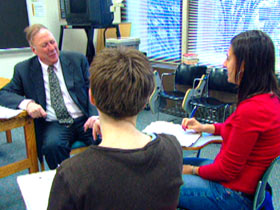
It is possible to be liberal and evangelical. And if we use “evangelical” in the broadest sense and went back to the early years of the 20th century, there were lots of evangelical Protestants advocating what we would now call liberal issues — economic issues in the progressive era. In practical terms, for a variety of historical circumstances, most evangelicals, and certainly fundamentalists, are now politically conservative. That’s partly because liberalism has gotten to be culturally as well as economically more liberal — with abortion, gay rights, and so forth — and partly because political conservatives have really shrewdly courted the evangelical and fundamentalist communities.
Does the GOP have a lock on evangelicals, by and large?
I can’t see anything that will change that in the foreseeable future, short of some extraordinary disaster, such as a Great Depression, for instance. If you go back to, say, 1928, when all really devout Protestants opposed Al Smith, to one degree or another, you find that some people we would now call evangelicals voted for that Catholic candidate because they were more concerned about the price of wheat, or preserving segregation. And it’s not impossible that some heavy secular issue would trump moral and religious concerns. But I don’t see that occurring in the near term.
For many people, the spokesmen of evangelicals would be Jerry Falwell or Pat Robertson. But do you think it’s more complicated than that — that there are evangelicals who don’t think they are good spokesmen at all, or don’t represent their views?
In a lot of polls, many evangelicals are skeptical of polarizing figures like Falwell or Robertson. We’ve also got to remember that leaders come and go; organizations come and go. The key organization of the Christian Right in the early ’80s was Falwell’s Moral Majority. Then, after his presidential effort fizzled in ’88, Robertson built the Christian Coalition. That’s pretty much down the drain. But there is still a grassroots, evangelical, fundamentalist culture out there that has a strong conservative political tilt. And even in those years when national religious issues don’t make the front page of THE NEW YORK TIMES or the network news, there still are these battles going on all over the place about sex education, about condoms in schools. That was even going on in the 1950s about some different issues (though sex education was there), before the Christian right was fully built.
The evangelical congressman I spoke with also said that it has become almost an obligation for evangelicals to become involved in politics. Do you think that’s an overstatement?
It depends on what you mean by “involved in politics.” Certainly, most evangelicals, like most other people, are not intensely active between elections. Many evangelicals and fundamentalists just don’t vote, as a lot of the rest of us just don’t vote. I think there’s no doubt that leading evangelical and fundamentalist figures would like the whole rank and file to be particularly active, but I don’t think there’s much sign that they’re more active than the population as a whole, and maybe even a little less.
Would it be fair to say that evangelicals represent the core constituency of the GOP?
I think we can now say that evangelicals are as solidly a core constituency of the Republican Party as blacks are solidly a constituency of the Democratic Party. Twenty-five years ago, we would have said that labor was a solid Democratic constituency, but it’s not anymore. Evangelical and fundamentalist Christians are much more solid as Republicans than the white working class is solidly Democratic. That’s been quite a change in a quarter century.
What would be required to get the evangelicals to switch to the Democratic Party?
A quick shift, I think, would require something cataclysmic. Political evolution happens. We would not have expected so many theologically moderate Republicans to switch to the Democratic Party on cultural issues, but that has happened, bit by bit, over the last 20 to 25 years. I have a number of evangelical students, no fundamentalists, at a cosmopolitan, secular university. It strikes me how much they are as complicated as anybody else. They go out on dates and sometimes drink beer, but they are considerably more reflective than the stereotype of the evangelical. And a new generation is going to develop, as new generations always develop. My guess is that the cultural shouting matches are going to get a little less loud, unless there is some extraordinary apocalypse.
Should John Kerry spend much of his time courting evangelicals?
I think it would be a political waste of time for Kerry to try to court evangelicals. Clinton, on the basis of his style, did much better among evangelicals than did Michael Dukakis, for example. But I don’t think Kerry can manage to do that at all, particularly with southern evangelicals. There was the joke that Michael Dukakis could not have carried the South with Robert E. Lee on his ticket. I think that probably will also apply to Senator Kerry.
Do you think that politics has in some ways watered down the evangelical theology?
I think American culture has watered down the evangelical theology. Let me give a specific example. If you went back to the advocates of Bible prophecy in the 1920s, they almost all would have said that very few of us will be saved, and lots of us will have to suffer through the tribulation. If you look at the prevailing versions of Bible prophecy now, it’s [that] the best of us will be raptured up, and we won’t have to suffer. That’s a softer view of the end times as the society is softer, more lax in general, than it was in the 1920s.
How did evangelical Republicans become a solid bloc?
It happened for a variety of reasons: the ’60s drove all of these cultural issues to the fore — sex, drugs, rock and roll, and that helped to mobilize evangelicals and give them a sense of threat. Ironically, they were also mobilized by Jimmy Carter, who thought he could win that constituency and keep it. He won it in ’76, to a larger degree than Democrats usually do. Carter was the first Democrat since Harry Truman to carry the Southern Baptists. But the evangelicals discovered soon enough that, though Carter had an evangelical style and called himself an evangelical, he was theologically and politically much more [liberal] than they had hoped. So there was this constituency out there that could be drawn over to the Republicans. And Reagan worked on it very hard. So, by the time we get to 1984, we get roughly the same voting percentage we have now of evangelicals and fundamentalists for Republicans. And if something has been part of a constituency for 20 years, you have to say it’s pretty solid.
Will evangelicals stick with President Bush perhaps longer than the rest of the country on the war in Iraq?
I think evangelical leaders will stick with President Bush much more firmly than the rest of the country. The evangelical rank and file, where you have a lot of families with troops in combat, may begin to ask questions about the merits of the war that would transcend any theological predispositions.
What impact did President Clinton have in the history of evangelicals in politics?
In the medium term, say 25 years, Clinton didn’t play much of a role. He certainly angered evangelicals and other cultural conservatives. Falwell came up with all sorts of peculiar conspiracy theories. But I don’t think [Clinton] affected the pattern of their votes over the medium term. He was just a target. Both Bill Clinton and Hillary Clinton were favorite targets for evangelicals because, without question, they were the culturally most liberal president and First Lady ever — much more so than the previous Democrats, Jimmy and Rosalyn Carter. Carter was personally opposed to abortion. Clinton said so, but that didn’t ring true. Hillary Clinton was much more a feminist wife than Rosalyn Carter. So I think Clinton provided an extraordinarily apt target, even before the Monica Lewinsky scandal. But I don’t think that’s changed the general trend of evangelical-fundamentalist voting.
So he didn’t draw that many evangelical voters, even though he is one himself?
Is Bill Clinton an evangelical? I doubt very much that Bill Clinton is an evangelical. “Born again” has become such a throwaway term; it doesn’t mean very much. People who say they are born again surely would have not passed the test of Jonathan Edwards, let alone Cotton Mather.


